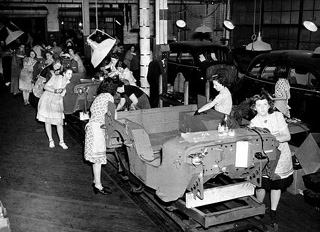| Home | Blog | Ask This | Showcase | Commentary | Comments | About Us | Contributors | Contact Us |

Galbraith: Deficits are the solution, not the problemCOMMENTARY | October 285, 2009Economist James Galbraith sees most of the news media as taking “confused and ignorant positions” on deficits; says we need more recovery bills “to reflect the true scale of the emergency.” These views, explained in everyday language, make for an excellent primer for reporters and editors on the deficit issue. (Part of our series on "Reporting the Economic Collapse.") By John Hanrahan Economist James Galbraith says there are “a lot of things that drive me not to read the press,” because of “the confused and ignorant positions of most of the news media” on the issues of deficits and fiscal policy. The worst offender in this regard, Galbraith said in an interview with Nieman Watchdog, is The Washington Post editorial page. “Their editorials reveal a lack of understanding of the structure of the economy...and an indifference to basic accounting,” Galbraith said. “To put the point firmly, they say that the economy is recovering but the deficits are a problem. But the economy is recovering because of the budget deficits. Without these budget deficits, there would be no recovery, because it is the deficits that are helping to put more money into households’ pockets. To talk of recovery but to criticize the deficits is ridiculous. The whole point of this thing [stimulus spending] is to add to the deficit. The patient is recovering from a deadly illness and yet the press is attacking the medicine.” We asked Galbraith about the editorials on the economy in the other two major East Coast-based newspapers, the New York Times and the Wall Street Journal. Galbraith declined offering specific critiques, responding: “I’m not a big reader of editorials in general. But the Washington Post is a broken record that one only has to consult occasionally. [Regarding deficits] they think that zero is the middle number and that balance is the same as virtue -- convenient and simple beliefs that can be repeated endlessly to the approval of others, equally clueless.” (See a representative recent Post editorial from July 10, 2009, headlined “Still Not Stimulated? Calls for additional spending by a government already neck-deep in red ink.” The editorial questions the need for a further stimulus package, laments the increasing budget deficit and the “red ink” more spending would involve, and warns that: “More fundamentally, the country may be testing its ability to borrow its way to recovery.”) Galbraith, the author of seven books, holds the Lloyd M. Bentsen Jr. chair in government/business relations and is a professor of government at the University of Texas, Austin. Deficits Are Boon, Not Burden As with the deficits issue, Galbraith criticized news and editorial coverage that unquestioningly reports the notion “of the relationship of the present to the future, the idea that the public debt puts the debt on our children and grandchildren. This is not true. If I incur a debt personally and die, it comes out of my estate or the pockets of my children. The public debt is not like that. There is the debt, yes, but there are also assets, namely the benefits that accrue to households today [through government stimulus spending]. Without deficits, people today will have no assets to pass down to their children and grandchildren.” Galbraith said that instead of holding the line on spending following the passage of the $780 billion stimulus measure earlier this year, “we need more recovery bills” that are larger and reflect “the true scale of the emergency.” In a Washington Monthly article last spring, he outlined an ambitious recovery spending program including public projects, open-ended aid to state and local governments, increases in Social Security and Medicare benefits, and comprehensive foreclosure relief, among other items. Alluding to the cost of such a program, Galbraith wrote: “The chorus of deficit hawks and entitlement reformers are certain to regard this program with horror. What about the deficit? What about the debt?...First, the deficit and the public debt of the U.S. government can, should, must, and will increase in this crisis. They will increase whether the government acts or not. The choice is between an active program, running up debt while creating jobs and rebuilding America, or a passive program, running up debt because revenues collapse, because the population has to be maintained on the dole, and because the Treasury wishes, for no constructive reason, to rescue the big bankers and make them whole.” Galbraith further said that “so long as the economy is placed on a path to recovery, even a massive increase in public debt poses no risk that the U.S. government will find itself in the sort of situation known to Argentines and Indonesians.” This is so, he wrote, “Because the rest of the world recognizes that the United States performs certain indispensable functions, including acting as the lynchpin of collective security and a principal source of new science and technology. So long as we meet those responsibilities, the rest of the world is likely to want to hold our debts.” As Galbraith said on another occasion, in support of more stimulus: “Government spending -- that is absolutely the reason why this has not turned into the [second] Great Depression.” Galbraith said not all coverage of the economic collapse had been poor. He singled out as “quite good” a book by Wall Street Journal economics editor David Wessel on the response of the Federal Reserve and Treasury Department to the financial crash of a year ago. (Wessel’s book is “In Fed We Trust: Ben Bernanke’s War on the Great Panic.”) Credit Won’t Flow Until Households Recover Galbraith likewise faulted a prevalent view in the press that “getting credit flowing from the banks” will spur recovery. This is exactly backward, he said. “First, comes household recovery and then the credit will flow,” he said. Right now, Galbraith said, tens of millions of Americans are in no position to seek loans because they lack collateral to borrow against, having lost jobs, lost value in their houses, lost value in stock holdings and retirement plans, etc. For the first time since the 1930s, he said, “millions of American households are financially ruined.” “Borrowers are as important as the lenders,” in bringing about recovery, and currently there is a paucity of borrowers because of the economic collapse. Citing the historical example of the Great Depression and World War II, Galbraith has written that it wasn’t until after the war that credit began to flow, despite all the jobs created by the New Deal and then by the war. Before the war, “incomes earned were spent” and while the spending increased consumption, “it did not jumpstart a cycle of investment and growth, because the idle factories left over from the 1920s were quite sufficient to meet the demand for new output.” During the war, as employment increased and consumer goods were in short supply because of the war effort (or production was ordered stopped, as in the case of automobiles), household finances became stronger and, with limited opportunities to buy consumer goods, millions of Americans “bought and held government bonds.” Following the war, Galbraith wrote, with the new availability of civilian goods, millions of these creditworthy Americans were in a position to borrow, causing credit once again to flow from the banks. The lesson applies today, Galbraith wrote: “(T)he full restoration of private credit will take a long time. It will follow, not precede, the restoration of sound private household finances. There is no way the project of resurrecting the economy by stuffing the banks with cash will work. Effective policy can only work the other way around.” Nevertheless, through the $700 billion TARP (troubled asset relief program), “we’ve given all this money to the banks, and the only place they can lend it to is back to the government.” ~~~~~~~~~~~~~ Next in the ‘Reporting the Crash’ series: Earlier in this series: Rein in entitlements? No. Increase them, says James Galbraith. It’s time the press stopped falling for false, ongoing efforts to portray Social Security and Medicare as going broke, says Galbraith in the first installment of his interview with John Hanrahan. As joblessness rises, reporters need to focus on calls for a second stimulus. Dean Baker sees a new, large stimulus as urgent. He has an alternate plan, also: Give companies tax credits to reduce workers’ hours (but not their pay) and put on new staff to take up the slack.
|




